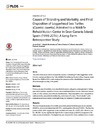Identificador persistente para citar o vincular este elemento:
https://accedacris.ulpgc.es/jspui/handle/10553/52613
| Título: | Causes of stranding and mortality, and final disposition of loggerhead sea turtles (Caretta caretta) admitted to a wildlife rehabilitation center in Gran Canaria Island, Spain (1998-2014): A long-term retrospective study | Autores/as: | Orós, Jorge Montesdeoca, Natalia Camacho, María Arencibia, Alberto Calabuig, Pascual |
Clasificación UNESCO: | 3109 Ciencias veterinarias | Palabras clave: | Chelonia-Mydas Green Turtles Marine Turtles Hawaiian-Islands Fibropapillomatosis, et al. |
Fecha de publicación: | 2016 | Publicación seriada: | PLoS ONE | Resumen: | Aims: The aims of this study were to analyze the causes of stranding of 1,860 loggerhead turtles (Caretta caretta) admitted at the Tafira Wildlife Rehabilitation Center in Gran Canaria Island, Spain, from 1998 to 2014, and to analyze the outcomes of the rehabilitation process to allow meaningful auditing of its quality. Methods: Primary causes of morbidity were classified into seven categories: entanglement in fishing gear and/or plastics, ingestion of hooks and monofilament lines, trauma, infectious disease, crude oil, other causes, and unknown/undetermined. Final dispositions were calculated as euthanasia (Er), unassisted mortality (Mr), and release (Rr) rates. Time to death (Td) for euthanized and dead turtles, and length of stay for released (Tr) turtles were evaluated. Results: The most frequent causes of morbidity were entanglement in fishing gear and/or plastics (50.81%), unknown/undetermined (20.37%), and ingestion of hooks (11.88%). The final disposition of the 1,634 loggerhead turtles admitted alive were: Er = 3.37%, Mr = 10.34%, and Rr = 86.29%. Er was significantly higher in the trauma category (18.67%) compared to the other causes of admission. The highest Mr was observed for turtles admitted due to trauma (30.67%). The highest Rr was observed in the crude oil (93.87%) and entanglement (92.38%) categories. The median Tr ranged from 12 days (unknown) to 70 days (trauma). Conclusions: This survey is the first large-scale epidemiological study on causes of stranding and mortality of Eastern Atlantic loggerheads and demonstrates that at least 71.72% of turtles stranded due to anthropogenic causes. The high Rr (86.29%) emphasizes the importance of marine rehabilitation centers for conservation purposes. The stratified analysis by causes of admission of the three final disposition rates, and the parameters Td and Tr should be included in the outcome research of the rehabilitation process of sea turtles in order to allow comparative studies between marine rehabilitation centers around the world. © 2016 Orós et al. This is an open access article distributed under the terms of the Creative Commons Attribution License, which permits unrestricted use, distribution, and reproduction in any medium, provided the original author and source are credited. | URI: | https://accedacris.ulpgc.es/handle/10553/52613 | ISSN: | 1932-6203 | DOI: | 10.1371/journal.pone.0149398 | Fuente: | PLoS ONE [EISSN 1932-6203], v. 11(2), e0149398 |
| Colección: | Artículos |
Citas SCOPUSTM
50
actualizado el 08-jun-2025
Citas de WEB OF SCIENCETM
Citations
60
actualizado el 01-feb-2026
Visitas
231
actualizado el 15-ene-2026
Descargas
130
actualizado el 15-ene-2026
Google ScholarTM
Verifica
Altmetric
Comparte
Exporta metadatos
Los elementos en ULPGC accedaCRIS están protegidos por derechos de autor con todos los derechos reservados, a menos que se indique lo contrario.
